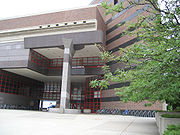
University of Minnesota Institute of Technology
Encyclopedia
The College of Science and Engineering (CSE) is one of the colleges of the University of Minnesota
in Minneapolis, Minnesota
. On July 1, 2010, the college was officially called the College of Science and Engineering (CSE), renamed from the Institute of Technology (IT). It was created in 1935 by bringing together the University’s programs in engineering
, mining
, architecture
, and chemistry
. Today, CSE contains 12 departments and 24 research centers that focus on engineering
, the physical sciences, and mathematics
.
and Mechanical Engineering
.
The University has also announced its intentions to become one of the top three public research institutions.

University of Minnesota
The University of Minnesota, Twin Cities is a public research university located in Minneapolis and St. Paul, Minnesota, United States. It is the oldest and largest part of the University of Minnesota system and has the fourth-largest main campus student body in the United States, with 52,557...
in Minneapolis, Minnesota
Minneapolis, Minnesota
Minneapolis , nicknamed "City of Lakes" and the "Mill City," is the county seat of Hennepin County, the largest city in the U.S. state of Minnesota, and the 48th largest in the United States...
. On July 1, 2010, the college was officially called the College of Science and Engineering (CSE), renamed from the Institute of Technology (IT). It was created in 1935 by bringing together the University’s programs in engineering
Engineering
Engineering is the discipline, art, skill and profession of acquiring and applying scientific, mathematical, economic, social, and practical knowledge, in order to design and build structures, machines, devices, systems, materials and processes that safely realize improvements to the lives of...
, mining
Mining
Mining is the extraction of valuable minerals or other geological materials from the earth, from an ore body, vein or seam. The term also includes the removal of soil. Materials recovered by mining include base metals, precious metals, iron, uranium, coal, diamonds, limestone, oil shale, rock...
, architecture
Architecture
Architecture is both the process and product of planning, designing and construction. Architectural works, in the material form of buildings, are often perceived as cultural and political symbols and as works of art...
, and chemistry
Chemistry
Chemistry is the science of matter, especially its chemical reactions, but also its composition, structure and properties. Chemistry is concerned with atoms and their interactions with other atoms, and particularly with the properties of chemical bonds....
. Today, CSE contains 12 departments and 24 research centers that focus on engineering
Engineering
Engineering is the discipline, art, skill and profession of acquiring and applying scientific, mathematical, economic, social, and practical knowledge, in order to design and build structures, machines, devices, systems, materials and processes that safely realize improvements to the lives of...
, the physical sciences, and mathematics
Mathematics
Mathematics is the study of quantity, space, structure, and change. Mathematicians seek out patterns and formulate new conjectures. Mathematicians resolve the truth or falsity of conjectures by mathematical proofs, which are arguments sufficient to convince other mathematicians of their validity...
.
Rankings
The programs offered by the College of Science and Engineering are rated among the best in the nation, particularly in Chemical EngineeringChemical engineering
Chemical engineering is the branch of engineering that deals with physical science , and life sciences with mathematics and economics, to the process of converting raw materials or chemicals into more useful or valuable forms...
and Mechanical Engineering
Mechanical engineering
Mechanical engineering is a discipline of engineering that applies the principles of physics and materials science for analysis, design, manufacturing, and maintenance of mechanical systems. It is the branch of engineering that involves the production and usage of heat and mechanical power for the...
.
The University has also announced its intentions to become one of the top three public research institutions.
Departments

- Aerospace Engineering and MechanicsAerospace engineeringAerospace engineering is the primary branch of engineering concerned with the design, construction and science of aircraft and spacecraft. It is divided into two major and overlapping branches: aeronautical engineering and astronautical engineering...
- AstronomyAstronomyAstronomy is a natural science that deals with the study of celestial objects and phenomena that originate outside the atmosphere of Earth...
- Biomedical EngineeringBiomedical engineeringBiomedical Engineering is the application of engineering principles and design concepts to medicine and biology. This field seeks to close the gap between engineering and medicine: It combines the design and problem solving skills of engineering with medical and biological sciences to improve...
- Chemical EngineeringChemical engineeringChemical engineering is the branch of engineering that deals with physical science , and life sciences with mathematics and economics, to the process of converting raw materials or chemicals into more useful or valuable forms...
and Materials ScienceMaterials scienceMaterials science is an interdisciplinary field applying the properties of matter to various areas of science and engineering. This scientific field investigates the relationship between the structure of materials at atomic or molecular scales and their macroscopic properties. It incorporates... - ChemistryChemistryChemistry is the science of matter, especially its chemical reactions, but also its composition, structure and properties. Chemistry is concerned with atoms and their interactions with other atoms, and particularly with the properties of chemical bonds....
- Civil EngineeringCivil engineeringCivil engineering is a professional engineering discipline that deals with the design, construction, and maintenance of the physical and naturally built environment, including works like roads, bridges, canals, dams, and buildings...
- Computer ScienceComputer scienceComputer science or computing science is the study of the theoretical foundations of information and computation and of practical techniques for their implementation and application in computer systems...
and EngineeringComputer engineeringComputer engineering, also called computer systems engineering, is a discipline that integrates several fields of electrical engineering and computer science required to develop computer systems. Computer engineers usually have training in electronic engineering, software design, and... - ElectricalElectrical engineeringElectrical engineering is a field of engineering that generally deals with the study and application of electricity, electronics and electromagnetism. The field first became an identifiable occupation in the late nineteenth century after commercialization of the electric telegraph and electrical...
and Computer EngineeringComputer engineeringComputer engineering, also called computer systems engineering, is a discipline that integrates several fields of electrical engineering and computer science required to develop computer systems. Computer engineers usually have training in electronic engineering, software design, and... - GeologyGeologyGeology is the science comprising the study of solid Earth, the rocks of which it is composed, and the processes by which it evolves. Geology gives insight into the history of the Earth, as it provides the primary evidence for plate tectonics, the evolutionary history of life, and past climates...
and GeophysicsGeophysicsGeophysics is the physics of the Earth and its environment in space; also the study of the Earth using quantitative physical methods. The term geophysics sometimes refers only to the geological applications: Earth's shape; its gravitational and magnetic fields; its internal structure and... - Industrial and Systems Engineering
- MathematicsMathematicsMathematics is the study of quantity, space, structure, and change. Mathematicians seek out patterns and formulate new conjectures. Mathematicians resolve the truth or falsity of conjectures by mathematical proofs, which are arguments sufficient to convince other mathematicians of their validity...
- Mechanical EngineeringMechanical engineeringMechanical engineering is a discipline of engineering that applies the principles of physics and materials science for analysis, design, manufacturing, and maintenance of mechanical systems. It is the branch of engineering that involves the production and usage of heat and mechanical power for the...
- PhysicsPhysicsPhysics is a natural science that involves the study of matter and its motion through spacetime, along with related concepts such as energy and force. More broadly, it is the general analysis of nature, conducted in order to understand how the universe behaves.Physics is one of the oldest academic...
- Additionally, CSE pairs with other departments at the UniversityUniversity of MinnesotaThe University of Minnesota, Twin Cities is a public research university located in Minneapolis and St. Paul, Minnesota, United States. It is the oldest and largest part of the University of Minnesota system and has the fourth-largest main campus student body in the United States, with 52,557...
to offer degree-granting programs in:- Bioproducts and Biosystems Engineering, with CFANS (formerly two departments: Biosystems and Agricultural EngineeringDepartment of Biosystems and Agricultural Engineering (Minnesota)The Department of Biosystems and Agricultural Engineering at the University of Minnesota was founded in 1909. As of 2009, the current department head is Shri Ramaswamy...
, and Bio-based Products) - StatisticsStatisticsStatistics is the study of the collection, organization, analysis, and interpretation of data. It deals with all aspects of this, including the planning of data collection in terms of the design of surveys and experiments....
- Bioproducts and Biosystems Engineering, with CFANS (formerly two departments: Biosystems and Agricultural Engineering
- And two other CSE units grant advanced degrees:
- Technological Leadership Institute (formerly Center for the Development of Technological Leadership)
- History of Science and Technology
Research centers
- BioTechnology Institute
- Characterization Facility
- Charles Babbage InstituteCharles Babbage InstituteThe Charles Babbage Institute is a research center at the University of Minnesota specializing in the history of information technology, particularly the history since 1935 of digital computing, programming/software, and computer networking....
- CBI website - Digital Technology Center
- Industrial Partnership for Research in Interfacial and Materials Engineering
- Institute for Mathematics and its Applications
- Nanofabrication Center
- NSF Engineering Research Center for Compact and Efficient Fluid Power
- NSF Materials Research Science and Engineering Center
- NSF Multi-Axial Subassemblage Testing (MAST) System
- NSF National Center for Earth-surface Dynamics (NCED)
- Center for Transportation Studies
- University of Minnesota Supercomputing InstituteUniversity of Minnesota Supercomputing InstituteThe University of Minnesota Supercomputing Institute in Minneapolis, Minnesota is an interdisciplinary research program providing supercomputing resources and user support to faculty and researchers. MSI is located on the University of Minnesota’s Twin Cities campus in Walter Library...
Educational centers
- History of Science and Technology
- School of Mathematics Center for (K-12) Educational Programs
- Technological Leadership Institute
- UNITE Distributed Learning

